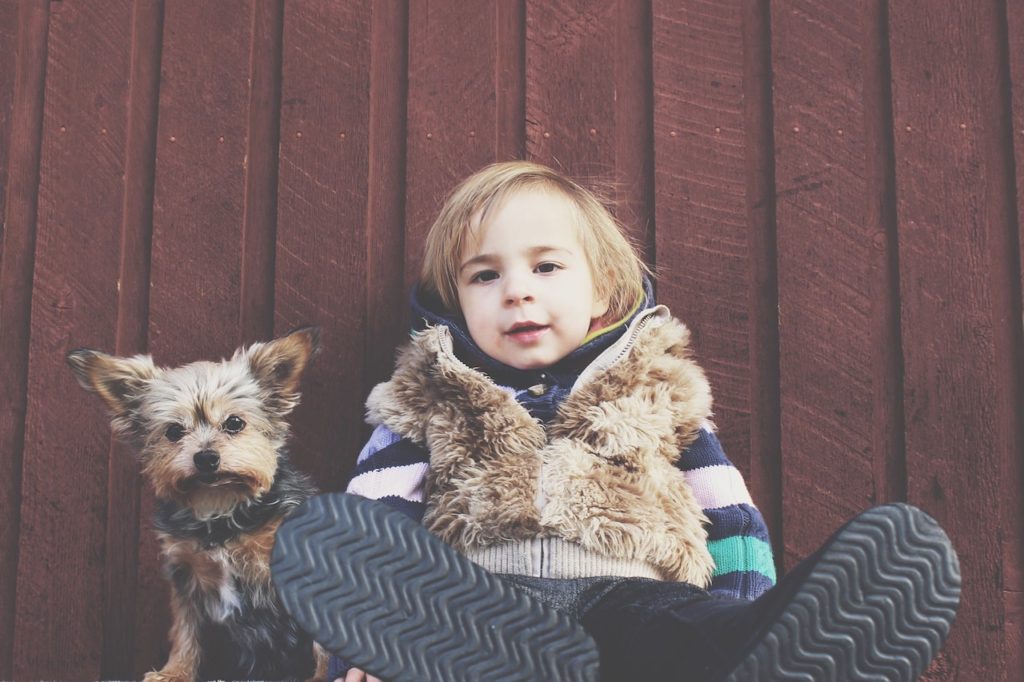Dogs are the perfect way to complete a family. They add so much joy and excitement to the home. They also teach many valuable life lessons about respecting other living beings. Older kids will be able to see how much work goes into taking care of a dog and younger kids will learn about personal space as well as how to be gentle with animals.
Dogs are very good for kids that get stressed out or anxious from school. The repetitive motion of stroking a dog will take their mind off stress and allow the body to release a hormone called oxytocin, which soothes the anxiety system.
Dogs are very energetic and love to play in the yard or go for long walks. This is an excellent source of exercise for your children. It gets them up off the couch and into the yard where they can run and play with their four-legged friend.
Dogs teach children so many valuable lessons, and they also make excellent best friends. While composing this list, we had several qualities in mind when looking for a good family dog. They need to intelligent, affectionate, and playful. We also rated them based on the amount they shed, their size, trainability, health, and the amount of exercise that is recommended for the breed. This list will help you decide which breed of dog is an excellent addition to your family.
1.) Golden Retriever
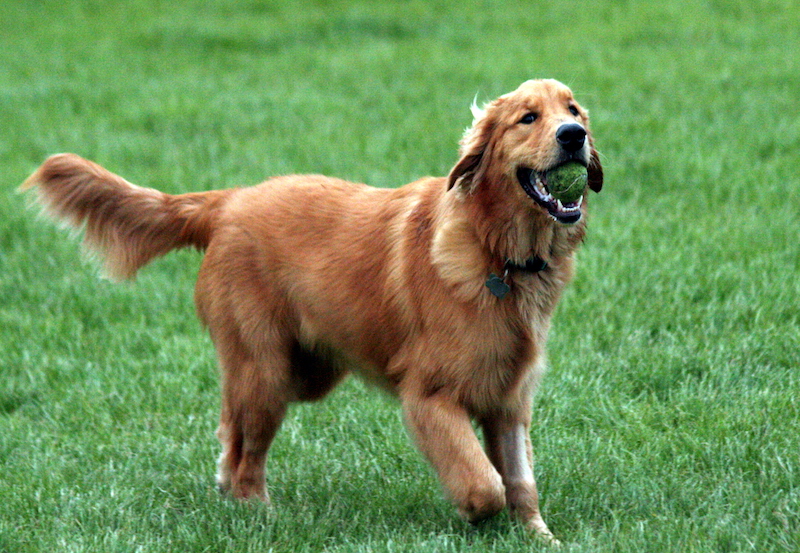
The golden retriever is one of the most popular family dog breeds in America, and for an excellent reason. They are loyal, friendly, and patient with young kids. They are really energetic and love to play outside. Running around with the kids in the yard or going on or regular walks are good ways to make sure they get the exercise they need. They are pretty easy to train, and this could even be a good project for older kids in the family to work on.
Golden Retrievers love to be with their families, but this can be bad when you have to leave them for a few hours. They respond well to crate training, so this could be an excellent way to keep them out of trouble during the day.
This breed can suffer from some pretty severe ailments over their lifetime. Dysplasia is a common problem with goldens, and it can affect the hips, knees, and elbows. It is a type of arthritis that affects mobility and if untreated may lead to a more severe deterioration in the bones. Von Willebrand Disease is a common blood disorder that goldens are prone to. This is caused by missing a clotting protein found in the blood. It may cause bleeding from the gums or nose. If injured, they might bleed more excessively as well. Make sure to schedule regular vet appointments to maintain good health and watch for serious health problems.
Pros
– Easy to train
– loves to play outside
– eager to please
– very patient
Cons
– Shed
– prone to health problems
– Separation anxiety
– Regular exercise
Score
Affectionate with family- 10/10
Playful – 10/10
Amount of shedding – 9/10
Size – 8/10
Easy to train – 10/10
Intelligence – 8/10
Health – 6/10
Exercise needed – 9/10
2.) Labrador Retriever
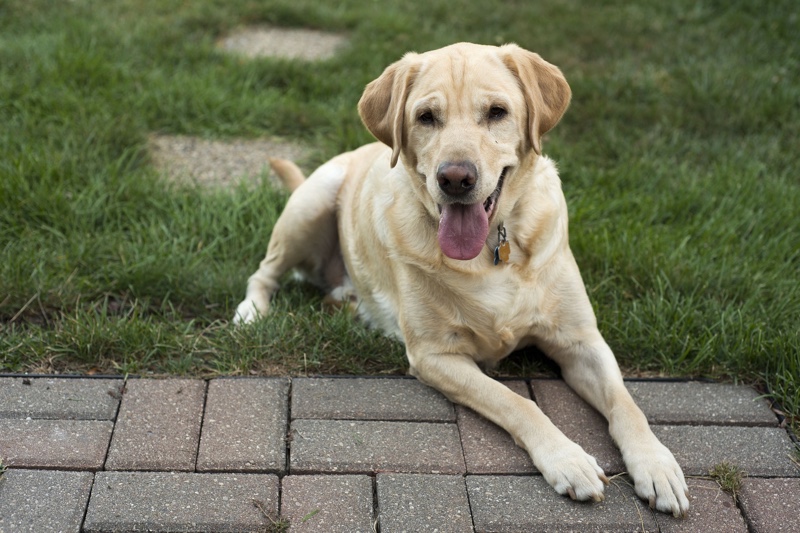
Labrador retrievers are very kind animals. They make excellent service dogs for members of the family that might need assistance. They are quickly trained and very loving animals.
Labs need a lot of exercise. Without it, they tend to have pent up energy and become destructive. Labs love to swim, so they make excellent pets for families with pools or that live close to water. They play well with kids and other dogs and overall love to spend time with their family.
Labs are typically healthy. They can suffer from hip and elbow dysplasia like other large breeds. Some can develop eye problems like cataracts and corneal dystrophy, but both can be fixed relatively easily with surgery. Obesity is a common problem with them due to a gene mutation and lack of exercise.
Pros
– Relatively healthy
– Easy to train
– Patient
Cons
– Shed
– Get bored easily
– Prone to obesity
Score
Affectionate with family- 10/10
Playful – 10/10
Amount of shedding – 8/10
Size – 8/10
Easy to train – 10/10
Intelligence – 10/10
Health – 8/10
Exercise needed – 9/10
3. Beagle
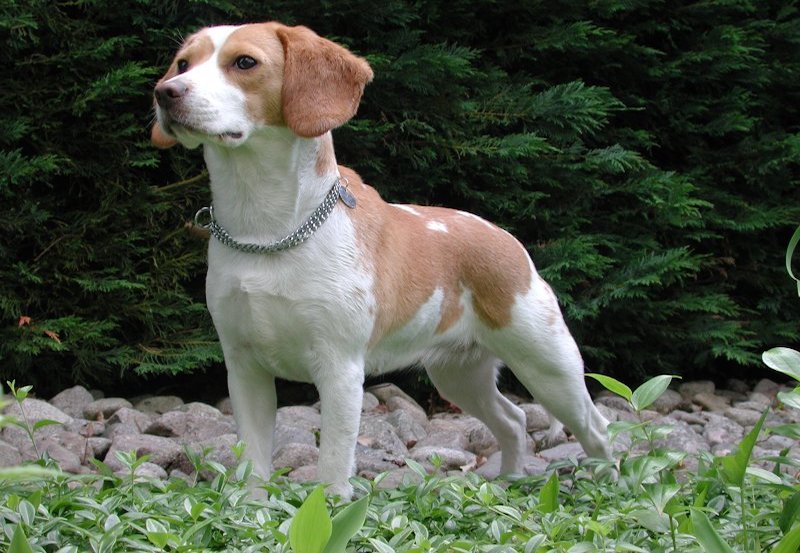
Beagles make terrific family dogs because they are delightful by nature. Like children, they are very curious and love to explore the world. They are incredibly playful and need lots of attention, which also make them great companions to children. They are outstanding for larger families because they love to be played with 24/7 and do well in a large group. They are a pack animal and do well with cats and other dogs.
Some beagles are talkative and bark or howl a lot. This might be bad for families that live in an apartment. They have a keen sense of smell and might regularly track scents throughout the house and yard. A fun activity that your kids could do with them is to hide toys around the house and let them use their nose to track them down.
Beagles are pretty low maintenance, which means you will not need to take them to the groomers often. They will be fine as long as they are brushed out at least once a week, which could be a fun activity for your children to do.
The typical lifespan of a beagle is 12-15 years. They are a relatively healthy breed but can suffer from epilepsy, which can be controlled through medication. They have long ears, which increases their chance of ear infections if not cared for properly. They also need regular exercise to keep them at a healthy weight.
Pros
– Gentle with kids
– Loves going on adventures
– Healthy
Cons
– Separation anxiety
– Loud
Score
Affectionate with family- 10/10
Playful – 10/10
Amount of shedding – 3/10
Size – 4/10
Easy to train – 9/10
Intelligence – 10/10
Health – 8/10
Exercise needed – 8/10
4.) Newfoundland
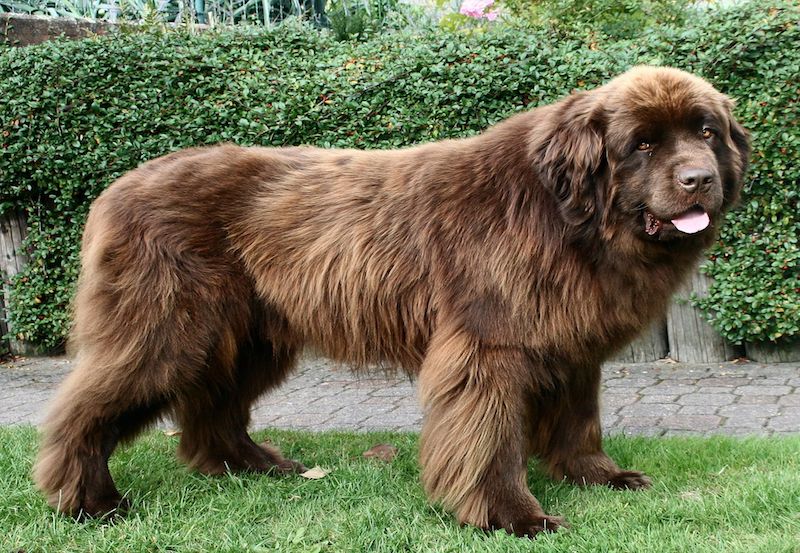
Do not be intimidated by their massive size because Newfoundland’s are known to be very calm and gentle with kids. You will have to make sure that you can provide them with lots of space in your home as well as in the backyard, but they make perfect companions. They aren’t always aware of their size and might knock over really young children that aren’t strong at walking. They are known as great babysitters and usually keep kids out of harm’s way.
This breed of dog loves to spend time outside with the family. They are great swimmers and make great pets for families with pools. They also love the snow and families that live in a cold climate will be able to be pulled on a sled or run through the snow with them. They need at least an hour of physical activity a day, so this is a perfect job for your little ones.
Newfoundland’s are prone to some pretty serious health conditions that might shorten their life. They suffer from hip and elbow dysplasias like most large breeds. Heart disease is also common among the breed, so be sure to take them to the vet regularly to monitor their health. They have a lifespan of about 8 to 10 years.
Pros
– Easily trained
– Love children
– Calm
Cons
– Separation anxiety
– Sheds
– Need a lot of space
Score
Affectionate with family- 9/10
Playful – 7/10
Amount of shedding – 10/10
Size – 10/10
Easy to train – 10/10
Intelligence – 8/10
Health – 5/10
Exercise needed – 7/10
5.) Irish Setter
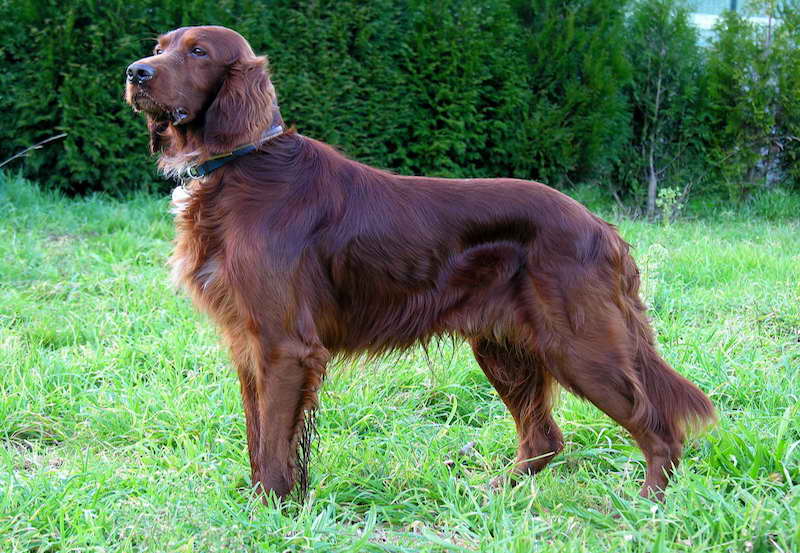
Irish setters have been voted as one of the most beautiful dog breeds by the American Kennel Club. They are loveable, affectionate dogs that love everyone they meet. They are big kids at heart and enjoy spending time playing with their family.
They need a lot of attention, so they will be delighted with children touching them all the time. They thrive with constant companionship, so do not leave them alone for too long, or they may get into trouble. They are natural hunters and will love to play games of hide and seek with children. Their hunting ability means that they are not good with rodents or other small animals in the house, so keep that in mind when adding one to your family.
Irish Setters have long silky hair that needs to be brushed out regularly. They will also need to go to the groomers regularly to make sure their hair does not get matted. They are a pretty healthy breed but suffer from dysplasia, especially in their hips. Gluten intolerance is becoming more common, so make sure that they are tested so you can adjust their diet accordingly.
Pros
– Friendly
– Respond well to praise
– Healthy
Cons
– Separation anxiety
– Shed
– serious health problems
– timid/shy with strangers
Score
Affectionate with family- 10/10
Playful – 10/10
Amount of shedding – 5/10
Size – 4/10
Easy to train – 9/10
Intelligence – 10/10
Health – 5/10
Exercise needed – 6/10
6.) Cavalier King Charles spaniel

King Charles spaniels are extremely cuddly companions. They love to be lazy and spend time sitting on the laps of those they love. They are perfect for families that spend a lot of time at home because they need a lot of attention and can suffer from separation anxiety if they are left alone for too long. Overall, they are very gentle with kids and other dogs but shy towards people they don’t know.
They are known for being lap dogs, but they are also surprisingly playful. They are a part of the sporting/toy breed, so they need regular physical activity. They love to chase the ball in the yard or go on long walks with the family. They are good at following commands and do very well with agility courses.
Sadly, king Charles suffers from many severe health conditions that can shorten their life span. Heart disease is the number one killer of the breed. They can also get a neurological disorder called syringomyelia. It affects almost half of the breed, but medication can help control it in most cases. Maintaining their health may be expensive, but the love they give makes it all worth it.
Pros
– Loyal to family
– Loves to cuddle
– Respond well to praise
Cons
– Separation anxiety
– Shed
– series health problems
– timid/shy with strangers
Score
Affectionate with family- 10/10
Playful – 10/10
Amount of shedding – 5/10
Size – 4/10
Easy to train – 9/10
Intelligence – 10/10
Health – 5/10
Exercise needed – 6/10
7.) Airedale Terrier
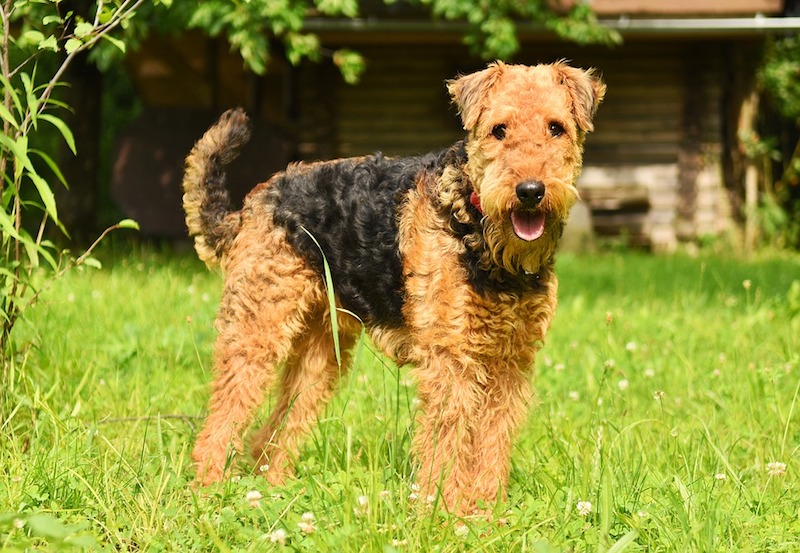
Airedale Terrier is the largest breed of terrier. They are known for being good babysitters and tend to keep kids out of harm’s way. They are suitable for families that are looking for a guard dog that is also good with kids. They are not good with strangers or other dogs that are not a part of their pack. Overall, the breed is affectionate and energetic and love to be around their family.
They can be loud as puppies so make sure to keep them busy with toys and regular exercise. If trained properly, they will grow out of that and become easier to manage. Airedales need a lot of attention which toddlers and young children are more than willing to give them. Older kids might enjoy taking them on walks or setting up agility courses in the backyard for them to run through. They are very intelligent and need a lot of mental stimulation, so it is crucial to make sure you keep their brain occupied, or they might get into trouble.
Airedales are typically a healthy breed of dog that has a lifespan around 10-12 years. They can suffer from hip dysplasia like a lot of other large breeds. They are also prone to hypothyroidism, which affects the thyroid glands and causes them to underproduce the thyroid hormone. Make sure that they have annual checkups with the vet to monitor their health.
Pros
– Intelligent
– Protective
– Hypoallergenic
Cons
– need regular exercise
– independent
– rowdy when young
Score
Affectionate with family- 7/10
Playful- 10/10
Amount of shedding – 6/10
Size – 6/10
Easy to train – 9/10
Intelligence – 10/10
Health 6/10
Exercise needed – 10/10
8.) Pug
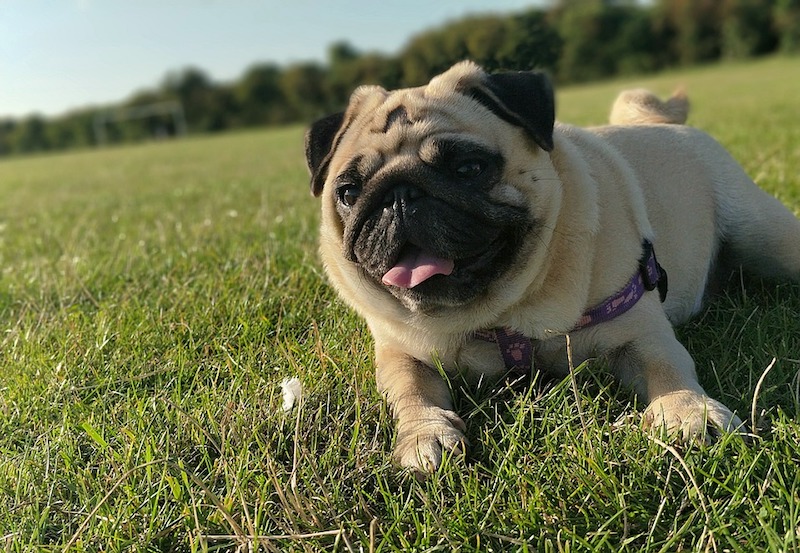
Pugs are known for having prominent personalities. They have so many cute facial expressions. That goes along with their famous personalities, which is always fascinating to watch. They are not an aggressive breed, which makes them perfect for families, and they are also pretty sturdy, which means that they can handle rough play.
Pugs love human companionship and can really be affected by their owner’s mood. They will go out of their way to help make their owners happy by being really affectionate and sticking close to them. They like to play but do not do well with too much physical activity because of their restricted airways.
Due to their pushed in noses, they tend to have breathing problems. This means that they also have issues regulating their own body temperature, and if they get overheated, they can suffer organ failure. It is vital to monitor their diet because if they become overweight, it will also be harder for them to breathe and control their body temperature.
Pros
– Sturdy
– Playful
– Eager to please
Cons
– Breathing problems
– Shed
– Big personality
Score
Affectionate with family- 10/10
Playful – 8/10
Amount of shedding – 7/10
Size – 3/10
Easy to train – 9/10
Intelligence – 10/10
Health – 6/10
Exercise needed – 5/10
9.) Portuguese Water Dog
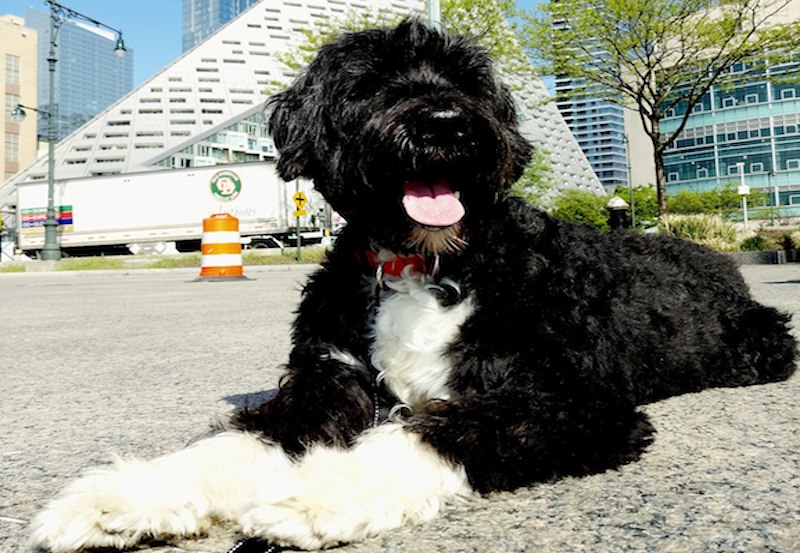
Portuguese water dogs make great pets for kids with allergies because they are hypoallergenic. They are kind of a rare breed but became more accessible when the Obamas famously adopted two during their time in the White House.
They are brilliant and make great family pets because they learn quickly. They need to spend time in the water, so they make great companions for families that spend a lot of time in a boat. They like to fish, so if that’s something your family enjoys, they will also be a great addition for that.
They need to be groomed regularly because they have thick curly or wavy hair. They will also need to brushed out to prevent mats and tangles. They are typically groomed in two different styles. One is called the lion cut, and that means that their lower half is completely shaved with longer hair around their face and the end of their tail, making them look like a lion. The other cut is known as the retriever cut, and it leaves them with more hair, which is the desired look for a majority of owners.
This breed is prone to genetic diseases because their gene pool is pretty small. They tend to have a lot of eye problems like cataracts and retinal atrophy. They also can get ingrown eyelashes because of their curly hair, so make sure to watch out for that as well.
Pros
– Kind
– Active
– Hypoallergenic
Cons
– Need to swim a lot
– Prone to mats
– They are pretty rare
Score
Affectionate with family- 10/10
Playful – 10/10
Amount of shedding – 5/10
Size – 4/10
Easy to train – 10/10
Intelligence – 10/10
Health – 7/10
Exercise needed – 7/10
10.) Vizsla

The Vizsla originated in Hungary but is quickly becoming a popular breed in the US. They are loyal companions and love to run around and spend time with their family. They are known to form close bonds with their family and will protect them from other dogs or people that they do not know. They tend to cry or whine when they feel like they are not getting enough attention to make sure that you spend as much time with them as you can.
They are pretty energetic dogs, so they will need regular exercise. They are a right hunting breed and like to perform retrieving activities. They will do well with endless games of fetch in the yard with the family. They also love the water, so swimming could also be a fun way to make sure they get their exercise.
If adopted from a responsible breeder, they are usually pretty healthy dogs with a life span of about 10 years. Some dogs might have skin or food allergies, so you need to monitor them to make sure you do not notice any changes. They are a short hair breed, so they do not need regular trips to the groomers.
Pros
– Loyal to family
– Active
– Low maintenance
Cons
– Large
– Cry when feeling neglected
– Overprotective with strangers
Score
Affectionate with family- 10/10
Playful – 10/10
Amount of shedding – 2/10
Size – 6/10
Easy to train – 9/10
Intelligence – 10/10
Health – 9/10
Exercise needed – 9/10
